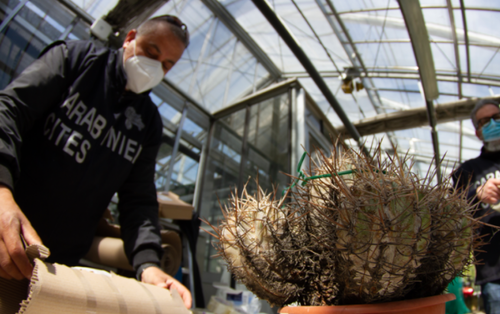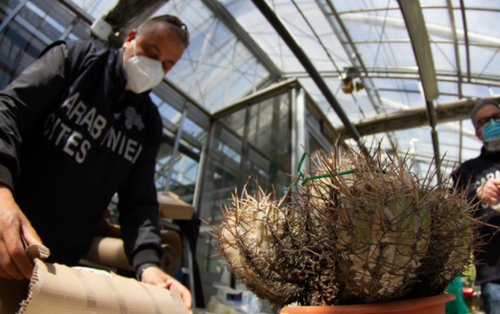
By Tyler Durden
Some of the world’s rarest cacti are found in the deserts of South America. A recent raid in Italy uncovered a smuggling network of thorny succulents, according to NYTimes.
The year’s long operation, dubbed “Operation Atacama,” was a collaborative effort that began in February 2020 by Italian and Chilean authorities to return some of the rarest cacti to Chile.
Andrea Cattabriga, a cactus expert and president of the Association for Biodiversity and Conservation, told NYT that Operation Atacama was absolutely stunning when 1,000 of some of the world’s rarest cacti (all from Chile) were seized in Italy.
Cattabriga said the 1035 seized cacti from genera Copiapoa and Eriosyce were worth $1.2 million on the black market. All of the cacti were protected plants in Chile and were illegally exported to Italy. Some of the plants were more than a century old.
NYTimes said most of the cacti had been returned to Chile, calling it “the biggest international cactus seizure in nearly three decades. It also highlights how much money traffickers may be earning from the trade.”
From seizure to repatriation, the succulents were housed in the Città Studi Botanical Garden of Milan, Italy, then shipped in boxes to Servicio Agrícola y Ganadero and Corporación Nacional Forestal in Santiago de Chile on April 19.
The massive seizure highlights the growing black market for rare cacti – comes when 30% of the world’s 1,500 cactus species are nearing extinction.
And who is to blame for smugglers clearing out deserts of rare cacti? Well, social media, of course.
These prickly succulents have been trending on social media for a few years, promoted by indoor plant influencers promoting cactus plants as the hottest look for any hipster home. The work-at-home transition during the pandemic only accelerated demand for cacti. But the average hipster’s cactus collection won’t include the rarest ones like ones seized in Italy because those plants cost thousands of dollars. Seasoned collectors from the US, Europe, Japan, and China demand the rarest cacti.
So add rare cacti to the black market of living wild animals, birds, and reptiles, along with body parts of rhino horns, elephant tusks, antelope scarves, and tiger bones.
“Just about every plant you can probably think of is trafficked in some way,” said Eric Jumper, a special agent with the Fish and Wildlife Service. He said rare cacti and other succulents extremely sought after, along with orchids and, more frequently, carnivorous species.
NYT points out the black market for plants is overlooked, calling it “plant blindness” because humans focus more on animals.
“The basic functioning of the planet would effectively grind to a halt without plants, but people care more about animals,” said Jared Margulies, a geographer at the University of Alabama who studies plant trafficking. “A lot of plant species are not receiving the amount of attention they would be if they had eyes and faces.”
Virtue-signaling hipsters who seek rare cacti in their homes as a fashion statement don’t realize that their demand in other parts of the world incentivizes smugglers to find these plants and consequently destroy the local ecosystem.





